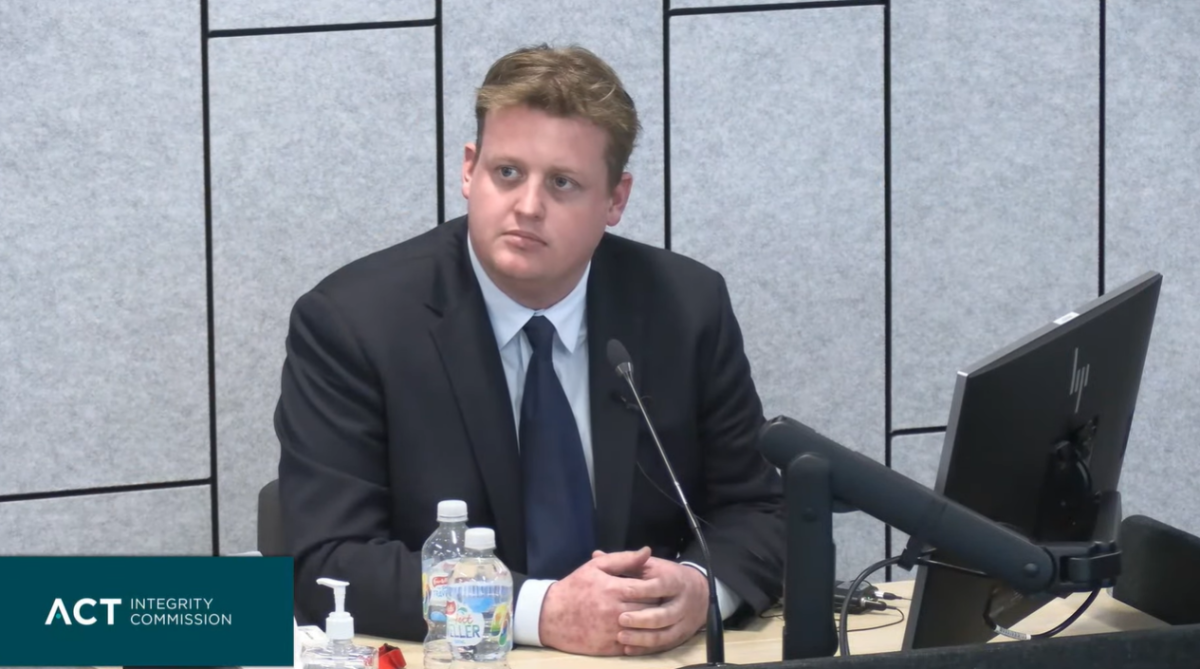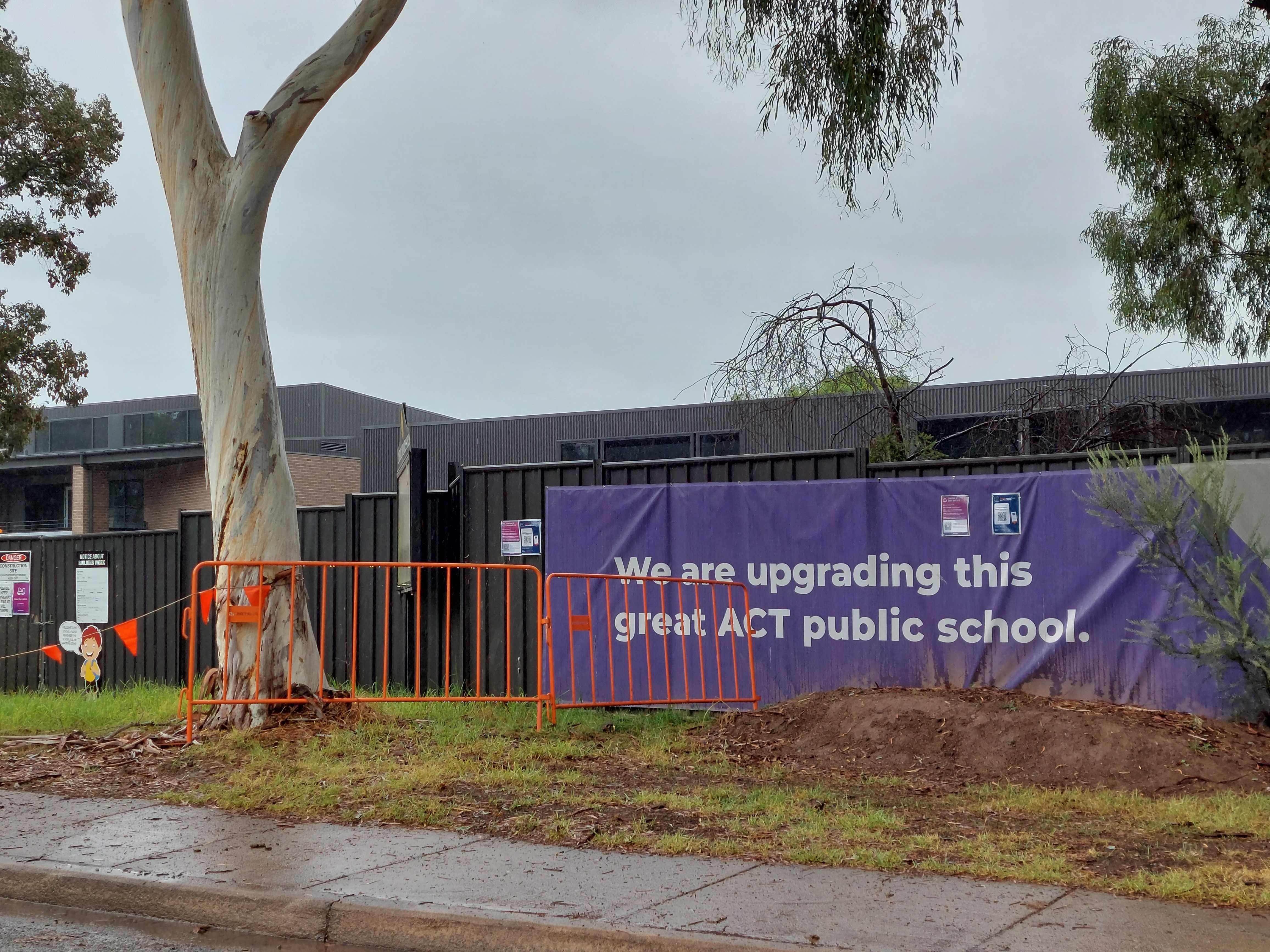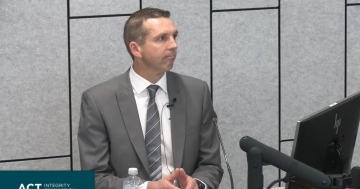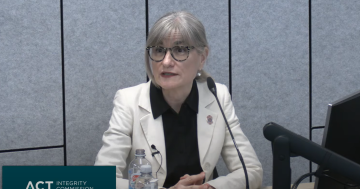
CFMEU ACT branch secretary Zachary Smith told the Integrity Commission he had experienced hostility from Manteena since starting work in Canberra 10 years ago. Photo: Screenshot.
The construction company that lost out on the Campbell Primary School modernisation project had a “fairly hostile approach to the union”, the ACT Integrity Commission has heard.
Fyshwick-based Manteena missed out on the tender for the project, which was instead awarded to Lendlease, despite being identified as the preferred tenderer in two key stages.
In evidence given to the commission on Wednesday (6 September), an education directorate official known by the pseudonym John Green spoke of “the unions’ expressed preference that Manteena not get the job” and suggested Manteena was aware that “they didn’t get the job because there was union influence in the decision making”.
Construction, Forestry, Maritime, Mining and Energy Union (CFMEU) ACT branch secretary Zachary Smith told the commission yesterday (7 September) that since he started working in Canberra in 2013, Manteena had a “fairly hostile approach to the union and union activities on their site”, whereas Lendlease paid its workers in accordance with a CFMEU-negotiated enterprise agreement.
Mr Smith spoke of a letter drafted to the ACT Government in April 2020, five months before the tender had been awarded to Lendlease, effectively warning the government not to work with Manteena.
“Our plan was that we would write to the ACT Government outlining our concerns based on our history with Manteena and identify why we thought there were concerns with the government awarding work and why those things should be taken into consideration when they make tender assessments,” Mr Smith said.
The commission heard that Manteena had adopted an approach that sought to exclude the union from enterprise bargaining agreements, which was also taken by a number of other organisations in connection with the Master Builders Association (MBA).
“It was the MBA and they were running a concerted campaign to, I would argue deceive, but to encourage or coerce workers into signing out the union as a lawful bargaining representative,” Mr Smith said.
ACT Integrity Commissioner Michael Adams asked Mr Smith whether the union wanted to leverage Manteena as an example of why contractors should comply with regulations by showing it would have “real-world consequences”.
“If a company such as Manteena were to lose a tender on the basis that its industrial relations policy was disputed by the CFMEU, that would give a powerful inducement for other companies to accept the CFMEU line,” Mr Adams said, to which Mr Smith agreed it would.
However, Mr Smith said although the union thought Manteena’s failure to adhere to industrial relations policy should be a reason for the government not to work with it, “I don’t think it ever crossed my mind that this would be a warning shot or a precedent to the industry”.
The commission also heard from CFMEU ACT secretary Jason O’Mara.
In earlier hearings, Mr Green told the commission that CFMEU members had concerns with Manteena and the government procurement process more broadly.
Counsel assisting Callan O’Neill asked Mr O’Mara if he had told Mr Green “one of the problems with government was that it was taking the cheapest price”, to which he said, “We’d been saying that since 2012”.
“It’d been a major ongoing problem,” he said.
“It’d given the Territory some really poor outcomes, poor standards of workmanship, poor safety outcomes and poor dollar value outcomes.”
Asked whether he told Mr Green Manteena shouldn’t get the Campbell job, Mr O’Mara said he didn’t.
“I was very happy to tell people whether a contractor was good or bad, but that was Mr Green’s job or the directorate’s job to work out who they actually used.
“I’m doubtful that I actually said they shouldn’t get the job, but I’m sure I was critical of their performance.”
The hearings continue today.





















